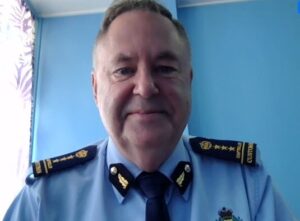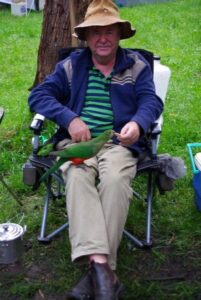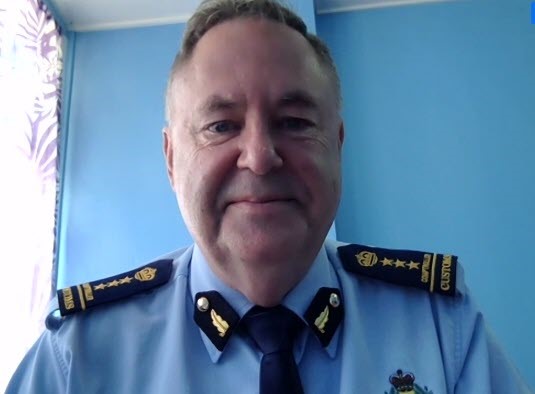
Head Solomon Islands Customs & Excise, Mr. Jim Sutton
 I want us to be WCO and WTO compliant and we are working towards that. I want our IT systems to be upgraded and on par with international standards. Once we get the upgrades completed, I will add on about 15 or 20 different modules that would be specifically targeted to the Customs and trade needs of this country.
I have recruited some international training experts in compliance and risk management, Customs audit, human resources and staff development, and cargo examination at the ports and airports. In a nutshell, that’s my vision. It’s a lot to achieve but it’s achievable
How has COVID-19 impacted Solomon Islands Customs?
There are a few main areas of our operations that have been affected. Two of our international advisors are currently offshore because of border closures and are unable to come, but they are working remotely. That makes delivery of face-to-face training difficult for those areas of expertise. We’ve built a training center, so it is waiting for more trainers to come in and better utilise it. We can’t bring in the IT specialists at the moment either, so they can’t come into the country just now, thus our IT upgrade has been pushed back for a year and a half so far. However, we have new recruits who are degree holders, some of them have IT programming degrees so we have a new skill set in that area.
COVID has generally put huge pressure on the government budget and we are finding it hard to get funds for some of our planned reform projects- even things like putting everyone into a nice new uniform is financially constrained. We don’t have any support from outside the government or anything like that so basically, we are on our own, although the Australian government is looking at providing us with limited procurement, which will help us. COVID has slowed our modernisation program to the point where it will probably take another two to three years to catch up from my original master plan.
What are the other critical challenges faced by Solomon Islands Customs?
Every organisation you’re coming into after civil unrest will have major internal problems. The biggest problem that I faced as soon as I got here was that of perceived endemic corruption in Customs by trade, so the first thing I did was deal with that issue internally within my organisation.
We also have a budgetary challenge- so that makes life a bit hard. Other than that, I think internally the biggest challenge I have is how to fight the fear of the unknown and change management- we have new recruits last year and this year, all graduates. I think the existing staff are fearful of change to a certain extent. They think they are going to be passed over for promotion because no one has a good degree or even a diploma, so my challenge is to make sure these officers are looked after and so we have designed some special training programs for them to pick up various skills and enhance technical knowledge.
The other challenge on the revenue collection front is also Covid related – for example, turning away vessels that had crew who were COVID-19 positive, which costs the government lost revenue, and general financial impact of the slow-down of the economy generally, affecting imports.
What would be your ideal job?
During one of my master’s degrees, I had to undertake a task called “brain mapping”, where you answer a series of psychiatric questions and the process result then tells you which job suits you. My assessment was that I was suited to be a magistrate or judge, which in many ways fits with the decision-making part of my current duties. Although I wouldn’t have minded becoming a farmer. There is something about small-scale rural life that entices me! Perhaps in retirement…
For more information, queries, or interview requests, please email MediaOCO@ocosec.org
About OCO: OCO is a grouping of 23 customs administrations in the Pacific region. It facilitates regional cooperation, information sharing, and capacity building of its members with the overall target of supporting economic growth and improved border security in the Pacific.
I want us to be WCO and WTO compliant and we are working towards that. I want our IT systems to be upgraded and on par with international standards. Once we get the upgrades completed, I will add on about 15 or 20 different modules that would be specifically targeted to the Customs and trade needs of this country.
I have recruited some international training experts in compliance and risk management, Customs audit, human resources and staff development, and cargo examination at the ports and airports. In a nutshell, that’s my vision. It’s a lot to achieve but it’s achievable
How has COVID-19 impacted Solomon Islands Customs?
There are a few main areas of our operations that have been affected. Two of our international advisors are currently offshore because of border closures and are unable to come, but they are working remotely. That makes delivery of face-to-face training difficult for those areas of expertise. We’ve built a training center, so it is waiting for more trainers to come in and better utilise it. We can’t bring in the IT specialists at the moment either, so they can’t come into the country just now, thus our IT upgrade has been pushed back for a year and a half so far. However, we have new recruits who are degree holders, some of them have IT programming degrees so we have a new skill set in that area.
COVID has generally put huge pressure on the government budget and we are finding it hard to get funds for some of our planned reform projects- even things like putting everyone into a nice new uniform is financially constrained. We don’t have any support from outside the government or anything like that so basically, we are on our own, although the Australian government is looking at providing us with limited procurement, which will help us. COVID has slowed our modernisation program to the point where it will probably take another two to three years to catch up from my original master plan.
What are the other critical challenges faced by Solomon Islands Customs?
Every organisation you’re coming into after civil unrest will have major internal problems. The biggest problem that I faced as soon as I got here was that of perceived endemic corruption in Customs by trade, so the first thing I did was deal with that issue internally within my organisation.
We also have a budgetary challenge- so that makes life a bit hard. Other than that, I think internally the biggest challenge I have is how to fight the fear of the unknown and change management- we have new recruits last year and this year, all graduates. I think the existing staff are fearful of change to a certain extent. They think they are going to be passed over for promotion because no one has a good degree or even a diploma, so my challenge is to make sure these officers are looked after and so we have designed some special training programs for them to pick up various skills and enhance technical knowledge.
The other challenge on the revenue collection front is also Covid related – for example, turning away vessels that had crew who were COVID-19 positive, which costs the government lost revenue, and general financial impact of the slow-down of the economy generally, affecting imports.
What would be your ideal job?
During one of my master’s degrees, I had to undertake a task called “brain mapping”, where you answer a series of psychiatric questions and the process result then tells you which job suits you. My assessment was that I was suited to be a magistrate or judge, which in many ways fits with the decision-making part of my current duties. Although I wouldn’t have minded becoming a farmer. There is something about small-scale rural life that entices me! Perhaps in retirement…
For more information, queries, or interview requests, please email MediaOCO@ocosec.org
About OCO: OCO is a grouping of 23 customs administrations in the Pacific region. It facilitates regional cooperation, information sharing, and capacity building of its members with the overall target of supporting economic growth and improved border security in the Pacific.